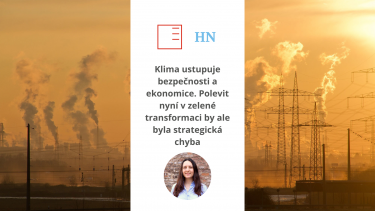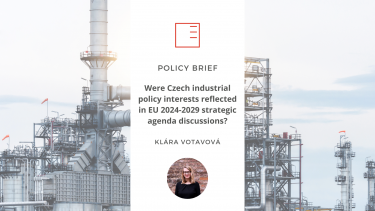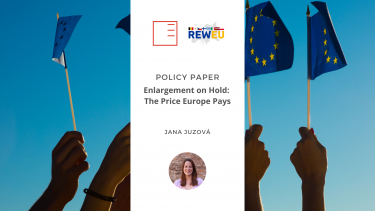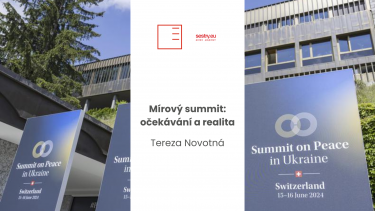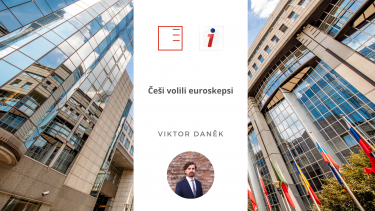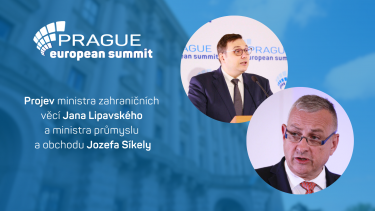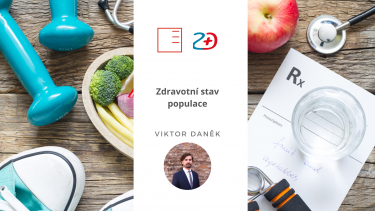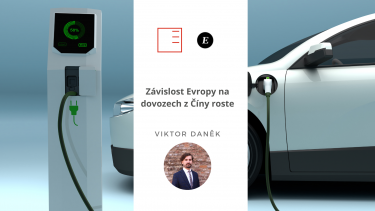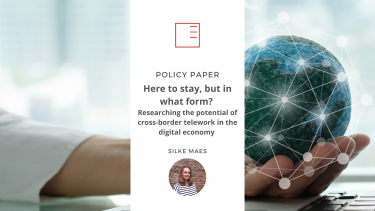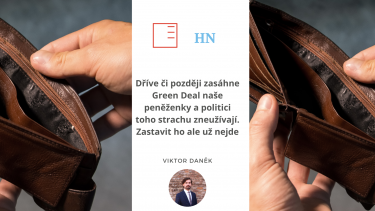Hospodářské noviny | Climate is giving way to security and economy. However, easing off on green transformation now would be a strategic mistake
This year's elections to the European Parliament have sparked debates about continuing the European plan to reduce greenhouse gas emissions to net zero by 2050, despite recent events suggesting the need to reassess this plan. The election results did not signify as much of a setback for European green ambitions as anticipated. The priority of climate and environment is no longer as high among most Europeans as it was five years ago, reflecting current political and international challenges such as security, economic prosperity, and the competitiveness of European industry. Kateřina Davidova, a researcher at EUROPEUM Institute, wrote an opinion piece on this topic for Hospodářské noviny.
Show more
Policy Brief | Were Czech industrial policy interests reflected in EU 2024-2029 strategic agenda discussions?
In light of the recent return of industrial policy to the global and EU stage, this policy brief outlines how Czech interests in this policy were reflected in the debates leading up to the adoption of 2024-2029 EU strategic agenda. First, it strives to define Czech industrial policy interests, outlining two alternative approaches to how they can be perceived. The liberal approach follows the long established consensus, according to which Czechia – as a very open, export oriented economy – should promote above all a seamless Single Market and free trade. Writes EUROPEUM Institute researcher Klára Votavová in her Policy Brief.
Show morePolicy Paper | Enlargement on Hold: The Price Europe Pays
How can the EU enlargement process regain its lost momentum? And how can we learn from previous rounds of enlargement? These questions are answered by a group of authors together with EUROPEUM Institute senior researcher Jana Juzová in a new publication within the REWEU project.
Show moreSestry.eu | Peace summit in Switzerland: expectations and reality
Ninety countries and organizations confirmed their participation in the Peace Summit focusing on the war against Ukraine in Switzerland. The United States will be represented by Vice President Kamala Harris, China refused to participate and Russia was not invited. What are the key goals of the summit? Why did China decide not to come? Researcher at EUROPEUM Institute Tereza Novotná commented for Ukrainian-Polish online outlet Sestry.eu.
Show more
iDnes.cz | Czechs voted Euroscepticism
European Parliament elections have been held in the EU Member States, but they have not shown the change of the course. According to Viktor Daňek, deputy director of EUROPEUM Institute, the elections did not shake Europe too much, but the future parliament will slightly lean more to the right.
Show morePrague European Summit | "Nuclear energy must be part of the Green Deal." Ministers Lipavský and Síkela presented their priorities for the next European Commis
Minister of Foreign Affairs Jan Lipavský and Minister of Industry and Trade Jozef Síkela delivered speeches at the 10th anniversary of the Prague European Summit. Both responded to the ever-changing challenges facing Europe and Russia's expanding aggression, while Minister Síkela stressed the need of economical transformation.
Show moreZdravotnický deník | Population Health
Politicians and companies should start putting more emphasis on prevention and education about active and healthy lifestyles, because the health of the population has a major impact on the competitiveness of companies and the national economy. Viktor Daněk, Deputy Director of EUROPEUM Institute, commented on this issue.
Show moreEkonomický deník | Europe's dependence on imports from China is growing
The essential components needed to grow the modern economy include chips and semiconductors, solar panels and batteries for electric cars. All of these are imported into Europe from Asian countries instead of manufacturing capacity being built here. Viktor Daňek, deputy director of EUROPEUM Institute, said it is necessary to open a debate on the reform of the common budget and new revenues.
Show morePolicy paper | Here to stay, but in what form? Researching the potential of cross-border telework in the digital economy
The rapid uptake of telework, facilitated by digitalisation, has upset a system based on physical presence in the workplace in the EU. Especially since the pandemic, telework has become increasingly prevalent and an integral part of employees’ working and expectation patterns. Our research fellow Silke Maes covered this topic in her policy paper, highlighting the challenges and opportunities telework presents for cross-border coordination.
Show moreHospodářské noviny | Sooner or later the Green Deal will hit our wallets and politicians are exploiting that fear. But it can't be stopped anymore
The Green Deal is becoming one of the main topics of the upcoming European Parliament elections. Candidate parties emphasize its importance and influence on future politics, with the expected changes affecting various sectors of the economy and the daily lives of citizens. In particular, the amendments to the rules for the ban on the sale of cars with internal combustion engines from 2035 and the upcoming ESG reporting, which could mean a significant administrative burden for medium-sized companies, are being discussed. The transformation towards green technologies brings both opportunities and challenges, and the outcome will depend on the skills and strength of individual negotiators in the coming negotiations. Viktor Daněk, deputy director of EUROPEUM Institute, discussed the topic in the Hospodářské noviny podcast.
Show moreStaroměstské náměstí 4/1
Prague 1 - Staré Město
110 00
tel.: +420 212 246 552
email: europeum@europeum.org
https://www.europeum.org
